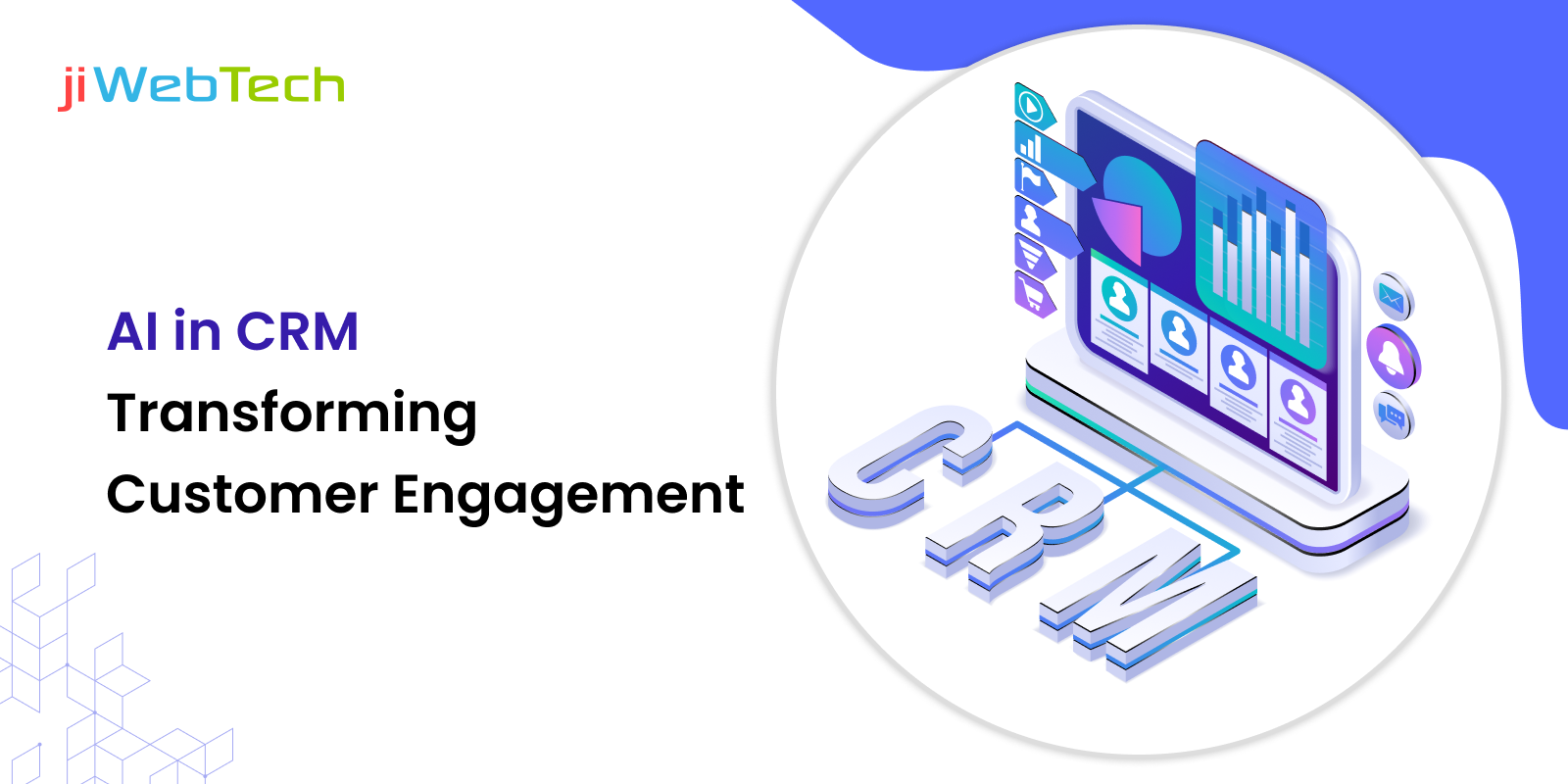- Jul 08, 2024
- Generative Ai
- 2757
Share this post on:

Today, we live in a customer-centric era, where customer relationship management (CRM) is necessary for business success. Customer Relationship Management enables businesses to build lasting relationships with customers and drive growth. In recent years, the integration of Artificial Intelligence (AI) has propelled CRM systems to new heights, revolutionizing how businesses interact with and understand their customers. But the question is, How does AI improve CRM? Can businesses benefit from AI-enhanced CRM software? What are the ways AI is revolutionizing? How AI is impacting CRM? Well, to get the answers continue reading the blog below.
Benefits of AI in CRM
Artificial Intelligence (AI) is reshaping the landscape of Customer Relationship Management (CRM), offering unprecedented opportunities for businesses to enhance their customer interactions, streamline operations, and drive growth. Let us explore the benefits of AI in the CRM industry.

1. Enhanced Customer Insights
AI-powered CRM systems can process and analyze vast amounts of customer data from multiple touchpoints, including social media, emails, phone calls, and purchase history. This comprehensive analysis provides businesses with deeper, more nuanced insights into customer behavior, preferences, and needs. By leveraging machine learning algorithms, AI can identify patterns and trends that might be invisible to human analysts. These insights enable companies to make data-driven decisions, tailor their offerings, and anticipate customer needs before they arise.
2. Personalized Customer Experiences
One of the most significant advantages of AI in CRM is its ability to deliver hyper-personalized customer experiences. AI algorithms can analyze individual customer profiles and behaviors to create highly targeted marketing campaigns, product recommendations, and communication strategies. This level of personalization extends beyond simple demographic segmentation. AI can consider factors such as browsing history, purchase patterns, and even real-time behavior to deliver relevant content and offers at the right moment, significantly improving customer engagement and satisfaction.
3. Predictive Analytics and Forecasting
AI excels at predictive analytics, allowing businesses to forecast future trends and behaviors based on historical data. In the context of CRM, this capability is invaluable for identifying potential customer churn before it happens, predicting which leads are most likely to convert, forecasting sales trends and revenue, and anticipating changes in customer demand. These predictive capabilities enable businesses to be proactive rather than reactive, allocating resources more efficiently and addressing potential issues before they escalate.
4. Automated Customer Service
AI-powered chatbots and virtual assistants have revolutionized customer service in the CRM industry. These tools can handle routine inquiries 24/7, improving response times, providing consistent answers to frequently asked questions, escalating complex issues to human agents when necessary, and learning from interactions to improve future responses. By automating these front-line interactions, businesses can significantly reduce operational costs while improving customer satisfaction through quick, accurate responses at any time of day.
5. Streamlined Sales Processes
AI is transforming sales processes within CRM systems. Intelligent algorithms can automatically score and qualify leads, identify high-value prospects, suggest optimal times for follow-ups, and recommend the next best actions for sales representatives. These AI-driven insights and automation allow sales teams to focus their efforts on the most promising opportunities, increasing efficiency and conversion rates.
6. Improved Data Quality and Management
Data quality is crucial for effective CRM. AI can significantly improve data management by automatically updating and cleansing customer records, identifying and merging duplicate entries, filling in missing information from various sources, and ensuring data compliance with regulations like GDPR. By maintaining high-quality, up-to-date customer data, businesses can make more informed decisions and provide better customer experiences.
Ways AI has transformed CRM
Customer Relationship Management (CRM) has long been a cornerstone of successful businesses, enabling them to build lasting relationships with customers and drive growth. In recent years, the integration of Artificial Intelligence (AI) has propelled CRM systems to new heights, revolutionizing how businesses interact with and understand their customers. Let us learn about the various ways AI is transforming CRM, ushering in a new era of personalized, data-driven customer engagement.

1. Improved Customer Analysis
AI solutions analyze vast amount of customer data in real time, providing invaluable insights. Machine learning algorithms can uncover patterns that human analysts might overlook, enabling businesses to anticipate customer needs and personalize interactions at scale. By understanding customer preferences and purchase histories, businesses can tailor their marketing strategies and product offerings, ultimately enhancing customer satisfaction and loyalty.
2. Predictive Analytics
One of the most powerful applications of AI in CRM is predictive analytics. By leveraging historical data and machine learning algorithms, businesses can forecast future trends, customer behaviors, and potential churn rates with remarkable accuracy. Predictive analytics enables proactive decision-making, allowing businesses to optimize marketing campaigns, predict sales opportunities, and intervene before customers are at risk of leaving. This proactive approach not only improves customer retention but also enhances operational efficiency and revenue generation.
3. Automation of Routine Tasks
AI-driven automation streamlines repetitive tasks within CRM systems, freeing up valuable time for sales and customer service teams to focus on higher-value activities. Chatbots powered by natural language processing (NLP) handle routine customer inquiries, providing instant responses and routing complex issues to human agents when necessary. AI also automates lead scoring and qualification processes, ensuring that sales teams prioritize leads most likely to convert into customers. By automating these tasks, businesses can improve response times, reduce operational costs, and deliver a more seamless customer experience.
4. Sentiment Analysis and Customer Sentiment Monitoring
Understanding customer sentiment is crucial for maintaining positive relationships and addressing issues promptly. AI-powered sentiment analysis tools analyze customer interactions across various channels, such as emails, social media, and customer reviews, to gauge sentiment and identify emerging trends or concerns. Businesses can swiftly detect and respond to negative feedback or issues, turning potential crises into opportunities for proactive customer service and relationship management.
5. Personalized Customer Experiences
AI enables hyper-personalization of customer experiences by creating individualized recommendations and communications based on unique customer preferences and behaviors. By analyzing past interactions and purchasing history, AI algorithms can suggest products or services that are highly relevant to each customer. Personalized marketing campaigns can be tailored in real time, delivering the right message to the right customer at the optimal time through preferred channels. This level of personalization fosters deeper customer engagement, increases conversion rates, and strengthens brand loyalty.
6. Improved Sales Forecasting and Performance
AI enhances sales forecasting by analyzing historical data, market trends, and customer behavior patterns. By providing accurate sales predictions and insights, businesses can allocate resources more effectively, optimize inventory levels, and plan marketing strategies with greater precision. AI-driven CRM systems also empower sales teams with intelligent recommendations and insights, helping them identify cross-selling and upselling opportunities to maximize revenue generation.
AI in CRM: Challenges
While Artificial Intelligence (AI) holds immense promise for transforming Customer Relationship Management (CRM), its integration also presents several challenges that businesses must navigate effectively. These challenges include:

1. Data Quality and Integration: AI relies heavily on data quality and availability. CRM systems require clean, accurate, and up-to-date data to train AI models effectively. However, many businesses struggle with fragmented data sources and siloed systems, making it difficult to achieve a unified view of the customer. Integrating data from various sources while maintaining consistency and compliance with data privacy regulations (such as GDPR or CCPA) poses a significant challenge.
2. Bias in AI Algorithms: AI algorithms are susceptible to bias, which can inadvertently perpetuate unfair treatment or discrimination. In CRM applications, biased algorithms may lead to inaccurate customer segmentation, biased recommendations, or unfair treatment in customer interactions. Addressing bias requires careful design, ongoing monitoring, and transparency in AI development and deployment processes.
3. Skills Gap and Training: Implementing AI in CRM necessitates specialized skills in data science, machine learning, and AI engineering. Many organizations face challenges in recruiting and retaining talent with these skills. Additionally, training existing staff to understand and effectively utilize AI tools within CRM systems can be time-consuming and costly.
4. Customer Privacy and Ethics: AI-powered CRM systems collect and analyze vast amounts of customer data to personalize experiences and predict behaviors. Balancing the benefits of personalized customer interactions with privacy concerns is crucial. Businesses must adhere to stringent data protection regulations and ensure transparent data handling practices to maintain customer trust.
5. Integration with Existing Systems: Integrating AI capabilities into existing CRM systems can be complex. Legacy systems may lack the flexibility or scalability required to support AI functionalities seamlessly. Ensuring compatibility, scalability, and minimal disruption to ongoing operations during the integration process is a significant challenge for many businesses.
6. ROI and Implementation Costs: While AI offers potential ROI through improved customer insights, enhanced productivity, and increased sales, the initial investment in AI technologies and infrastructure can be substantial. Businesses must carefully evaluate the costs versus benefits and develop a clear strategy for measuring and achieving ROI from AI-powered CRM initiatives.
7. Change Management and User Adoption: Introducing AI into CRM workflows often requires changes in business processes and employee workflows. Resistance to change, lack of understanding, or insufficient training can hinder user adoption and diminish the effectiveness of AI implementations. Successful AI integration requires proactive change management strategies and continuous support to foster acceptance and utilization among employees.
8. Over-reliance on AI without Human Oversight: AI can automate and optimize many aspects of CRM, but human oversight remains essential. Over-reliance on AI-driven decision-making without human judgment can lead to missed opportunities or misunderstandings in customer interactions. Businesses must strike a balance between automation and human intervention to ensure ethical and effective CRM practices.
Conclusion
In conclusion, AI is transforming CRM from a simple database into a powerful tool for building meaningful customer relationships - ultimately enhancing customer satisfaction and driving growth. At JiWebTech, we understand the importance of AI in CRM and developing the best AI-integrated CRM solutions. Our experts are well-versed in AI and CRM, which makes it easy for businesses to grow and enhance return on investment. Contact us today and let our developers help you elevate your business.










